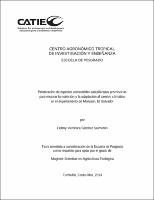| dc.contributor.advisor | Muschler, Reinhold | |
| dc.contributor.author | Sánchez Salmerón, Delmy Verónica | |
| dc.date.accessioned | 2022-04-19T04:53:03Z | |
| dc.date.available | 2022-04-19T04:53:03Z | |
| dc.date.issued | 2013 | |
| dc.identifier.uri | https://repositorio.catie.ac.cr/handle/11554/11732 | |
| dc.description | Tesis (M. Sc) -- CATIE, Turrialba (Costa Rica), 2013 | es_ES |
| dc.description | 122 páginas : Ilustraciones, tablas ; 21.59 x 27.94 cm. | |
| dc.description | Tesis en español con resumen en inglés. | |
| dc.description | Incluye bibliografías en las páginas 90-94. | |
| dc.description.abstract | La presente investigación aporta al conocimiento sobre especies comestibles subutilizadas en la Microregión Cacahuatique Sur, Morazán de El Salvador, una zona caracterizada por altos niveles de desnutrición crónica en menores de cinco años. La investigación tuvo como objetivo contribuir al rescate de especies subutilizadas promisorias para mejorar la nutrición ante los efectos del cambio climático mediante la identificación de las especies comestibles subutilizadas, y su priorización según su potencial de contribuir a mejorar la nutrición y la adaptación al cambio climático. El trabajo también propone lineamientos que puedan ayudar en la promoción y conservación de las especies. La información se recopiló por medio de entrevistas semiestructuradas con informantes claves y en talleres participativos. Se consultó literatura secundaria y se realizaron análisis de contenido de nutrientes de algunas especies selectas. La información se analizó usando estadística descriptiva. Se comparó el conocimiento entre personas mayores y menores de 50 años, usando un ―índice de conocimiento desarrollado en el presente estudio, que se sometió a un análisis de varianza (ANOVA). La priorización de las especies se hizo usando criterios nutricionales y de adaptación al cambio climático (tolerancia a sequía, inundación, vientos fuertes y alta temperatura). Se identificaron 40 especies comestibles subutilizadas en la Microregión, de las cuales 23 resultaron ser promisorias basado en los criterios nutricionales y de adaptación al cambio climático, 11 fueron priorizadas por la población para comenzar a promover en la Microregión. Para promover las especies de una manera sostenible se identificaron siete líneas de acción, haciendo énfasis en la creación de conciencia institucional. | es_ES |
| dc.description.abstract | This research provides knowledge about underutilized edible species in the region ―Cacahuatique Sur, Morazán, in El Salvador. This region is characterized by high levels of chronic malnutrition of children younger than 5 years, has low crop diversity, and is threatened by global climate change effects, in particular droughts. The main objective of this research was to contribute to the rescue of underutilized species with the potential to improve nutrition, even under the effects of climate change, by identifying and prioritizing underutilized edible species based on their potential to improve nutrition and their contributions for climate change adaptation. The primary information, collected using semi-structured interviews with key informants and participatory workshops, was complemented by secondary literature and the analysis of the nutrient content of selected species. Overall, 40 species were identified as underutilized edible species in the region, of which 23 were labeled of high interest based on nutritional and climate change adaptation criteria. Finally, out of this group, 11 species were prioritized by local people to be promoted in the region. In order to promote and protect underutilized potential species sustainably, seven lines of action were identified, emphasizing the creation of institutional awareness and the effective integration of all the involved sectors including education, health care, and culture with the actors at municipalities, local organizations and NGOs operating in the area. | es_ES |
| dc.format.extent | 122 páginas | es_ES |
| dc.language.iso | es | es_ES |
| dc.publisher | Centro Agronómico Tropical de Investigación y Enseñanza (CATIE) | es_ES |
| dc.relation.ispartof | Magister Scientiae en Agricultura Ecológica | |
| dc.subject | AGROBIODIVERSIDAD | |
| dc.subject | ESPECIES | |
| dc.subject | NUTRICIÓN | |
| dc.subject | SEGURIDAD ALIMENTARIA | |
| dc.subject | OLIGOELEMENTOS | |
| dc.subject | NUTRIENTES MINERALES | |
| dc.subject | CONOCIMIENTO INDIGENA | |
| dc.subject | RESILIENCIA | |
| dc.subject | CAMBIO CLIMÁTICO | |
| dc.subject | ADAPTACION | |
| dc.subject | RECURSOS GENETICOS | |
| dc.subject | VITAMINA A | |
| dc.subject | AGROBIODIVERSITY | |
| dc.subject | SPECIES | |
| dc.subject | NUTRITION | |
| dc.subject | FOOD SAFETY | |
| dc.subject | TRACE ELEMENTS | |
| dc.subject | MINERAL NUTRIENTS | |
| dc.subject | INDIGENOUS KNOWLEDGE | |
| dc.subject | RESILIENCE | |
| dc.subject | CLIMATE CHANGE | |
| dc.subject | ADAPTATION | |
| dc.subject | GENETIC RESOURCES | |
| dc.subject | VITAMIN A | |
| dc.subject | EL SALVADOR | |
| dc.subject.other | Sede Central | es_ES |
| dc.title | Priorización de especies comestibles subutilizadas primisorias para mejorar la nutrición y la adaptación al cambio climático en el departamento de Morazán, El Salvador | es_ES |
| dc.type | Tesis de maestría | es_ES |
| dc.identifier.status | openAccess | es_ES |
| dc.subject.sdg | ODS 3 - Salud y bienestar | es_ES |


